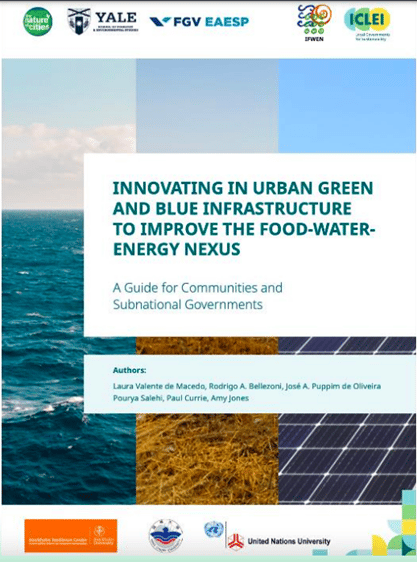Join JPI UE
Faq
FAQ
Please click here for the frequently asked questions we collected.
If you have an additional questions you are welcome to mail us at info@jpi-urbaneurope.eu
The trade-offs between food, water and energy can generate unsustainable urbanization pathways, which contribute to socio-economic problems including poverty, conflicts and diseases. However, too little is known about the intersection of FWE in cities. On the other hand, Green and Blue Infrastructure (GBI) has emerged as a viable solution to many urban problems with low cost, sustainable outcomes.

The guidebook directs cities to improve food-water-energy nexus using green and blue infrastructure in cities. The food-water-energy nexus is based on “systems thinking” instead of “silos thinking” to help integrate different sectors and departments in managing resources to improve efficiency and quality in the use of food, water and energy. By identifying the connections between these elements and the sectors involved in their governance, this guide adopts an “urban metabolism” approach. It outlines an integrated management vision in providing environmental services to its inhabitants. By considering the synergies and trade-offs between these resources within a collaborative governance approach, the methodology presented here can help urban managers and policy makers on the pathway toward sustainable development.
Atlas of FWEN Innovation and Green and Blue Infrastructure
Special Issue in the Journal of Cleaner Production: “Innovations in Urban Green and Blue Infrastructure: Tackling local and global challenges in cities”
Read the results interview!
IFWEN – Understanding Innovative Initiatives for Governing Food, Water and Energy Nexus in Cities
Duration: 2018–2021
Website: ifwen.org
Contact: Jose A. Puppim de Oliveira, FGV/EAESP
E-mail: jose.puppim@fgv.br
Budget: 1.309.831 €
Partners: Getulio Vargas Foundation (FGV), Sao Paulo School of Management (FGV/EAESP), The Nature of Cities, Ming Chuan University, The Africa Secretariat of ICLEI, The Stockholm Resilience Center, ICLEI, Yale University, UNU-Flores, Ming-Chuan University